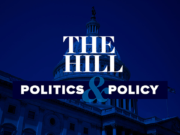Name a problem in politics, and somebody will blame Citizens United for it. Corruption, gridlock, negative campaigning—but also gun violence, taxes, and bad health-care policy. It doesn’t matter if there is any relationship, or how far back one can trace the problem. Someone, somewhere is pinning the blame on the 2010 Supreme Court ruling.
The New York Times just tried to pin much of the blame on Citizens United for President Trump’s withdrawal from the Paris Agreement on June 1. Its June 3 story “How G.O.P. Leaders Came to View Climate Change as Fake Science” is the latest entry in the Times’ anthropological study of the strange species known as “Republicans.” It sets out to explain once and for all how the GOP came to view climate change with skepticism.
The answer it comes up with? The Koch brothers, “unshackled” by Citizens United, paid them to. “Republican lawmakers were moved along by a campaign carefully crafted by fossil fuel industry players, most notably Charles D. and David H. Koch,” the story notes.
Why nine years? Because John McCain was the Republican nominee for president in 2008, and he supported climate and energy policies that diverged from the party’s mainstream position. By starting with McCain and ending with President Trump’s withdrawal from the Paris Agreement, the Times is able to present the withdrawal from Paris as a shift in Republican and U.S. policy. This serves as corroborating evidence for the theory that self-motivated donors, empowered by Citizens United, manipulated the GOP into opposing progressive climate policies.
This Is Revisionist History
Whether you support or oppose taking action on carbon emissions, a fair observer can see the Times story got the history wrong. Among Republicans, McCain’s presidential campaign was the outlier and opposition to climate deals has been and remains the norm.
In fact, Congress has rejected international efforts to police climate issues for at least two decades. In 1997, the U.S. Senate expressed its disapproval of the Kyoto Protocol in a resolution that passed 95-0. Recognizing a lost cause, President Bill Clinton did not even submit Kyoto to the Senate for ratification.
The George W. Bush administration was no different. “The president has been unequivocal. He does not support the Kyoto treaty,” White House spokesman Ari Fleischer said in 2001. So much for the notion that withdrawing from Paris was only made possible by “an all-fronts campaign” in the wake of Citizens United, as the Times suggested.
Acting as if McCain was a bellwether for conservatives in 2008 is even more laughable, but the Times tries: “It is difficult to reconcile the Republican Party of 2008 with the party of 2017, whose leader, President Trump, has called global warming a hoax, reversed environmental policies that Mr. McCain advocated on his run for the White House…”
McCain has long held the reputation as a “maverick” in his party, and the cap and trade bills he co-sponsored during the Bush years failed every time because they lacked Republican support. A better way to figure out what Republicans were thinking about climate change in the pre-Citizens United era is to ask them, which Pew Research Center did in 2006.
The results show a clear divide already existing between Democrats and Republicans on climate change—a “partisan chasm,” in more pretentious terms. In 2006, Republicans were three times more likely than Democrats to believe there was “no solid evidence” of climate change, and only 24 percent believed climate change was due to human activity, compared to 54 percent of Democrats. (For what it’s worth, Americans in general were more likely to be “not at all” concerned with climate change than were citizens of Great Britain, France, Germany, India, Japan, China, and every other country surveyed.)
One presumes these Americans were not poring over white papers from the Competitive Enterprise Institute or receiving calls from energy industry lobbyists when forming their opinion. Surely, also, Democrats and environmental groups were working just as hard to shape public opinion on climate. Yet the Times attributes Republican skepticism towards climate change solely to party leadership and major donors. The headline refers to “G.O.P. Leaders,” not the GOP, and the article centers on “Republican lawmakers,” not Republicans.
But wait, there’s more:
Unshackled by the Supreme Court’s Citizens United decision and other related rulings, which ended corporate campaign finance restrictions, Koch Industries and Americans for Prosperity started an all-fronts campaign with television advertising, social media and cross-country events aimed at electing lawmakers who would ensure that the fossil fuel industry would not have to worry about new pollution regulations.
Of course, Citizens United did not “end corporate campaign finance restrictions,” and corporations are still prohibited from contributing to candidates, political parties, or regular political action committees (PACs). The New York Times really ought to know better by now, but this is a long–standing pattern.
The Times’ hand-wringing over “television advertising, social media and cross-country events” elides the fact that these tactics are only effective if voters agree with the underlying message they promote. The same is true of the “No Climate Tax” pledge Americans for Prosperity circulated in 2008, which the story also makes a big deal out of.
Instead of ignoring voters, the Times should engage with them, and not assume that every political machination is the product of some plutocrat’s plotting. Campaign finance law has gone through a number of changes from the mid-1990s to the present, but Republican skepticism towards climate change, and of the proposals put forward to fight it, has been present throughout.
Just look at the American Clean Energy and Security Act of 2009. That bill died in the Senate, but was passed by the House and praised by The New York Times as the “first time either house of Congress had approved a bill meant to curb the heat-trapping gases scientists have linked to climate change.” But it passed with only eight Republicans voting yes, compared to 168 voting no. You can’t blame Citizens United for that—the Supreme Court had yet to rule.
The Times’ condescending story boils down to this: wealthy donors fund shady organizations that pressure vulnerable politicians into taking positions they know to be wrong. But if you buy that, you also have to accept the futility of using campaign finance restrictions to push policy in the “right” direction. Congress said no to Kyoto during a time with no McCain-Feingold law and no super-PACs. Cap and trade proposals died in Congress during a time with McCain-Feingold and no super-PACs. Paris was never ratified, and was ultimately withdrawn from, during a time with super-PACs and only some surviving provisions of McCain-Feingold. So what’s the solution?
The irony is that the Times article ultimately damages its own crusade on climate policy. It may well cause some activists to give up hope because the anti-climate forces are supposedly too strong. Others who support taking action on climate policies may instead channel their energy into counterproductive efforts to limit speech.
The simple reality is that repealing Citizens United or otherwise restricting political speech will not make Republicans vote like Democrats on carbon or anything else. There is no “one weird trick” for achieving major shifts in national policy. It takes hard work, over many years, uniting many different groups, and employing many different tactics. The answer isn’t to restrict the other side’s speech, but rather to get in the game yourself.
This post originally ran in The Federalist on June 14th 2017.














